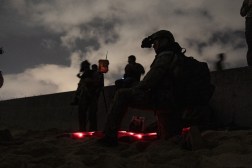Marines planning to use large language models to help mine information repositories

The Marine Corps has set its sights on using large language models to help service members retrieve critical information and plan missions.
The effort is part of a broader push by the Marines to implement a new artificial intelligence strategy, according to Capt. Chris Clark, AI lead at the deputy commandant for information’s Service Data Office.
“We’re not trying to develop necessarily a Marine Corps ChatGPT-like capability, but what we are doing instead, which goes back to goal one of the AI strategy, is we are aligning AI with the mission. And in this case, what we’ve identified is the Marine Corps has a massive repository of after-action reports from every exercise, deployment, operation that we’ve done for decades. And that’s in the Marine Corps Center for Lessons Learned. And so what we’re doing … is developing a large language model system that can take that repository of information that right now is very difficult to get, you know, the results that you’re looking for out of for a number of reasons, you know, partly because there’s a lot of information in there but also it can be difficult to search and it can be difficult to find exactly what you’re looking for and what applies to your specific mission set,” Clark said during a Defense One “Genius Machines” event that aired Tuesday.
“And so with the large language model as a piece of that solution, we’re able to take that repository using what’s known as RAG — retrieval augmented generation — and using the large language model to then take user input, you know, plain text input from a standard user … [and] use the RAG implementation — which takes the information, puts it into a database and then can retrieve, based on the question [and] what that user is looking for, back to the large language model and be able to output that in a way that’s usable, that really, you know, is cross-cutting across the Marine Corps and provides critical information for Marines to make decisions on how to plan that next exercise, operation, deployment, whatever it is that they’re doing. And they’re able to take that data and do a lot with it, whether it’s summarize, you know, decades of information into a concise report or, you know, being able to just find key pieces of information and trends within that data. And so that’s one area that we’re looking at using large language models,” he added.
Officials also want to identify other use cases for the technology as Marines look to build out new capabilities across the Corps.
The primary aim of the recently released AI strategy is to gain a comprehensive understanding of mission-specific problems where artificial intelligence offers a solution, according to officials. The deputy commandant for information’s Service Data Office has been tasked with shepherding that effort.
To that end, Marines intend to create a repository of “candidate Al use cases” and a mechanism to manage the use case process that will inform service-level decisions and activities.
“We’re not looking to compete with the large language model ecosystems like [OpenAI’s] ChatGPT, Google’s Gemini, [Microsoft’s] Copilot and the others. But instead, we’re going to leverage the best of the best that we have access to as the back end, the large language model piece of it, to then continue to work on solving the problems that we want to solve,” Clark said. “We’re still experimenting, but I think it’s going to be pretty powerful once we are able to roll this out to the Marine Corps and really affect the way that we plan missions.”






